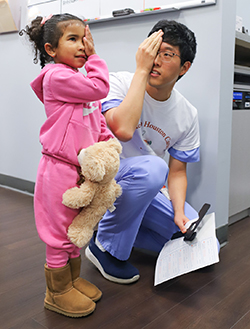Focusing on a brighter future for children can begin with something as simple as eye health.
Eye exams are as critical for a child’s health and development as their pediatric well-check. Poor vision can lead to developmental delays and possibly affect performance in school. Parents can help ensure proper eye health for their children by understanding the value of these exams and following a screening schedule.

“Eye exams are important to pick up on conditions that can permanently affect vision if left untreated,” said Layla Ghergherehchi, MD, a pediatric ophthalmologist at Robert Cizik Eye Clinic – Texas Medical Center.
Understanding vision screenings vs. eye exams
Texas is one of 40 states that mandate vision screenings for school-age children. It also requires screenings for preschoolers, which includes even fewer states. Ghergherehchi said pediatricians and schools will usually perform vision screening for kids. This involves checking vision with an eye chart, which provides a subjective report of a child’s vision. Another option is using a photoscreener, which can detect significant refractive error or misalignment of the eyes.

“The goal of vision screening is to identify children who may have vision issues and find the problems early so that hopefully they can be treated,” said Ghergherehchi, Bernice Weingarten Chair in Ophthalmology and assistant professor with McGovern Medical School at UTHealth Houston. “If there is any concern on vision screening exams, then a more in-depth examination is recommended.”
Ophthalmologists perform eye exams, which are comprehensive exams that evaluate alignment, vision, refractive error, eye pressure, and anatomy of the eye. Ghergherehchi said a complete exam involving dilating the pupils can be done on any child regardless of age or ability to cooperate.
Be proactive
One of the best things parents can do for their children regarding eye health is to be proactive, Ghergherehchi said. It’s critical to ensure kids are getting vision screening exams or regular eye exams if the child has already been established with an eye doctor.
“I’d rather see a bunch of normal exams than pick up on a problem when a kid is older, and we may not be able to do enough about it,” Ghergherehchi said. “If you feel that something doesn’t seem right, it’s always best to get it checked out.”
What are some common conditions that children experience when they have eye issues? Strabismus and refractive error are two of the most common, according to Ghergherehchi. Both can lead to amblyopia, which is reduced vision caused by abnormal visual development. This can occur when something affects vision in early childhood.
“Amblyopia can be permanent if not treated early enough,” she said.
Make time for outdoors
According to the National Eye Institute, about 42% of Americans are nearsighted, up from 25% in 1971. External factors can play a big role in a few eye conditions, Ghergherehchi said, including nearsightedness or myopia.
“We recommend that children limit ‘near work’ as much as possible and balance that time with playing and being outdoors,” she said. “Something about being outside is protective and can slow down the progression of myopia.”
Ghergherehchi said experts understand that large amounts of “near work” contribute to myopia, which naturally includes looking at phones and tablets. Spending time outside is one of the healthiest ways to protect a child’s eyesight.
Plan for vision screenings
Children should receive yearly vision screenings at their well-child checkups until the age of 5, according to Ghergherehchi, and then follow up every one to two years after that. She also recommends at least one comprehensive exam around kindergarten to ensure nothing has been missed that could affect a child’s learning.
“If children are passing their routine vision screening assessments, then they don’t need regular comprehensive eye exams by an eye doctor,” she said.
She does recommend scheduling comprehensive eye exams when:
- A child fails a vision screening or is unable to participate in the vision screening.
- The child has a visual complaint or abnormal visual behavior.
- The child has a medical condition that puts them at higher risk of eye problems.
- The child has a developmental delay.
Getting an early start with healthy eyes can make a difference in a child’s future focus.



